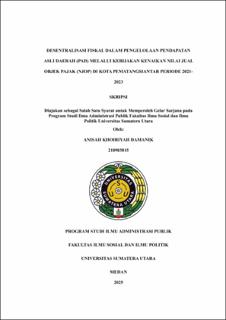Desentralisasi Fiskal dalam Pengelolaan Pendapatan Asli Daerah (PAD) melalui Kebijakan Kenaikan Nilai Jual Objek Pajak (NJOP) di Kota Pematangsiantar Periode 2021-2023
Fiscal Decentralization in the Management of Regional Original Revenue (PAD) through The Policy of Increasing the Sale Value of Taxable Objects (NJOP) in Pematangsiantar City for The 2021–2023 Period

Date
2025Author
Damanik, Anisah Khoiriyah
Advisor(s)
Trimurni, Februati
Metadata
Show full item recordAbstract
Fiscal decentralization is a policy that grants authority to regional
governments to independently manage finances and revenue sources. Within the
framework of regional autonomy, strengthening Local Own-Source Revenue (PAD)
is essential to achieving fiscal independence. One of the efforts made by the
Government of Pematangsiantar City to increase PAD was through the policy of
raising the Sales Value of Taxable Object (NJOP), as outlined in Mayor Regulation
Number 4 of 2021. However, in its implementation, the policy received various
responses from the public due to the substantial increase and the lack of public
participation in the policymaking process. Therefore, this research was conducted
to analyze the NJOP increase policy as a fiscal instrument.
The research method used is descriptive qualitative. Data were obtained
through interviews with the Head and Head of Revenue Division I of the Regional
Financial and Revenue Management Agency (BPKPD) of Pematangsiantar City,
the Mayor of Pematangsiantar for the 2017–2022 period, a representative from the
Regional People's Representative Council (DPRD), and community members
directly affected by the policy. This study was analyzed using the rational policy
model by Herbert Simon, further developed by Barros (2010), which includes four
indicators: defining the problem, setting policy objectives, generating policy
alternatives, and selecting and implementing solutions.
Based on the research results, it can be concluded that the NJOP increase
policy in Pematangsiantar City was mainly driven by the need to increase PAD due
to the region's low fiscal independence. However, the policy was established without
active community participation and without a phased approach, leading to public
resistance. Moreover, the policy initially had a negative impact on PAD, although a
nominal increase was observed in the following year. Nevertheless, the policy has
not yet fully reflected the principles of rational, inclusive, and participatory
policymaking.
Collections
- Undergraduate Theses [1936]
